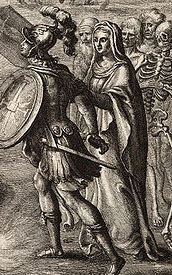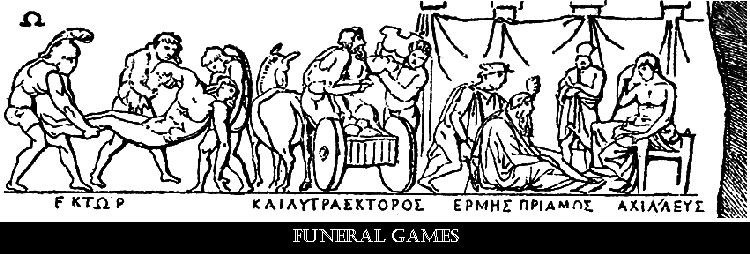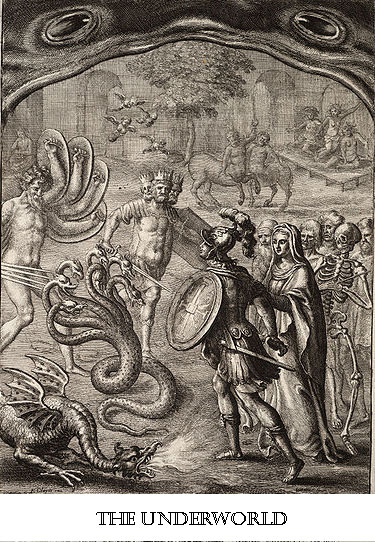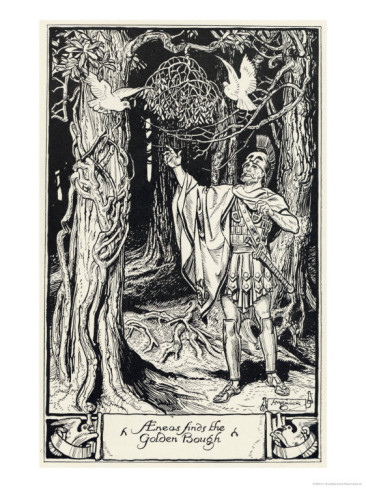
Aeneas in Sicily and Finding the Golden Bough
Unit Overview:
In this unit, Aeneas’s arrival in Sicily and his search for the Golden Bough will be discussed.
When Aeneas and his men set sail from Carthage, he had no idea that Dido had committed suicide. As the ships sailed away from the port, the sailors saw a large pall of smoke hanging over the city. Pall is a word that describes anything that covers or spreads over something. It is frequently used when talking about something gloomy. The sailors guessed that it was Dido’s funeral pyre, but they all avoided Aeneas and did not make eye contact with him. Aeneas stood at the stern of the ship and stared back at Carthage until the city and the smoke disappeared on the horizon.
As the group sailed on, they encountered strong winds and dark clouds. A man named Palinurus was the helmsman, or person who steers a ship, of Aeneas’s ship. He told Aeneas that he felt if this weather continued, they would never reach Italy. Palinurus believed that if they changed course, they would sail to the coast of Sicily. Aeneas then instructed Palinurus to change course.
The ships took to the wind and quickly landed on the shore of Drepanum. This was the place where they had buried the ashes of Aeneas’ father, Anchises a year earlier. This land was inhabited by Trojans and ruled by Acestes, the son of a Trojan woman and Crimisus, the river god. The people of Drepanum greeted Aeneas and his men happily.
Aeneas and his men rested that night. The next morning, they gathered together. Aeneas announced that he wanted to celebrate the anniversary of his father’s death. He felt that the gods had led them to Drepanum on purpose, and that they needed to show respect to his father’s memory. Aeneas first placed a myrtle wreath on his head. The myrtle is a shrub that is found in southern Europe. It has evergreen leaves, fragrant white flowers, and aromatic berries. The myrtle was sacred to Venus and was often the emblem of love. His sailors did the same. Aeneas then led the group to the large burial mound. He poured libations of wine, milk, and blood. He called upon the spirit of his father. As if it was an answer to his calling, a large and colorful snake slid out from beneath the shrine. It slithered all around the grave, tasted each offering, and then returned to its hole. Aeneas was encouraged by this strange event. He took it to be a positive omen, and he continued with the ritual. They sacrificed other animals and made offerings upon the altars.
A great feast followed these rituals. Aeneas announced that there would be funeral games. Although the idea of having a game at a funeral seems disrespectful to some of us today, this was an honor for the dead. News of the competitions spread. Large crowds gathered, eager to watch. The games began with a regatta, which is a rowing and boat event. The first event was a rowing race. Four specific boats were selected to compete. The ships completed the course in which they had to paddle out of the harbor and around a group of half submerged rocks. Then they had to return to the starting point. One ship almost capsized, or overturned, when making the turn around the rocks. Thankfully, all of the sailors returned to harbor safely.

The next set of events were running competitions. The citizens gathered in a natural amphitheatre, or area that provided seating and a central space for events, for these races. Many men entered these races, hoping to win a prize.The victor would receive an olive wreath. Aeneas also organized a boxing match. Only two men volunteered for this competition. Both were heavyweight champions and wanted to be victorious. The fight was vicious, or severe. Aeneas had to stop the fight because it became apparent that the men would fight to the death.
Archery events were held after the boxing match. Several heats, or preliminary events, were held. Four archers tied for first place. The final event involved a ships mast. There was a dove tied to the top by a cord. The archers needed to shoot the dove with an arrow. The first man’s arrow hit the mast. The second archer cut the cord that held the dove to the mast. The third archer’s arrow hit the bird in flight. The last competitor was Acestes. He simply shot his arrow into the sky, not even bothering to take aim. The flying arrow caught fire and fell in an impressive blazing arc. This was taken to be a sign from the gods that Acestes was a great archer.
The final event of the games involved a display of horse riding. The Trojan men paraded around the arena. The crowd cheered. Ascanius led his own formation of riders. He was riding a horse that Dido had given to him. When the parade was over, the horsemen preformed a mock battle, showing the crowd their skillful riding in a stressful situation.
Juno was still resenting the Trojans. She resented that they were experiencing a positive time in Drepanum. She planned to delay their voyage to Italy. She sent Iris, her messenger, to earth with a mission. Iris found a group of Trojan women on the beach. The women were crying and complaining to each other. They were grieving for Anchises but also for their own situation. They were tired of traveling and not having a proper home. Quickly, Iris disguised herself as an old woman. She joined the group of Trojan women and encouraged their complaining. Iris told the group that they should give up hope of ever reaching Italy. She told the Trojan women that they should settle in Drepanum. Iris then grabbed a torch from the nearby temple of Neptune. She ran toward the Trojan ships with the torch. She asked the other Trojan women to help her burn the ships, claiming that it was the ships that were bringing them bad fortune. The group of women were seized suddenly by madness. They followed Iris’ example and set fire to every ship.
When the citizens at the games saw the clouds of black smoke, they were suddenly alarmed. Ascanius rode off toward the beach; he was followed by the other Trojan boys. Ascanius saw what the women had done. He ordered them to stop. His shouting broke Juno’s spell. The women ran in different directions, looking for hiding spots. By the time Aeneas and the other men arrived, the ships were burning out of control. It seemed like there was nothing they could do.
Aeneas was desperate. He prayed to Jupiter for help. He believed that the fleet of ships could be saved from destruction. Before Aeneas could finish his prayers, rain began to pour down. The storm was so violent that the earth shook with Jupiter’s thunder. The ships were flooded with rain and the fires were extinguished. Only four ships were damaged beyond repair. The rest of the fleet was saved.
Although the ships were saved, this was yet another negative event for the Trojans. Aeneas began to doubt his plan to find Italy. He started thinking he should just give up hope. Just then, Nautes, an old man who was thought to be able to see into the future, approached Aeneas. He addressed Aeneas as a “son of a goddess.” He told Aeneas that he had read the signs and that he had advice for him. He said that Aeneas should speak with Acestes and plan together. Nautes told Aeneas that many of the Trojans were too old and frail to suffer more hardships. He asked that Aeneas leave them in Drepanum to make their new lives. He asked that Aeneas build them a new city and name it Acesta in honor of the king.
Aeneas thought about this plan and he contemplated it for a long time. He was unable to make up his mind. One night, his father appeared to him in a dream. Anchises told Aeneas that he understood that he was under a lot of stress, feeling like the fate of Troy was on his shoulders. He reminded Aeneas that Jupiter was watching over him, using the rain storm that saved the ships as an example of this protection. Anchises told Aeneas that Nautes advice was sound, or reliable, and that Aeneas should do what Nautes suggested. Aeneas should pick the strongest and smartest people to continue on with him to Italy, the land of Latium. Anchises said that once they landed in Italy, they would have a rough start. Before Anchises left Aeneas’ dream, he gave him one other piece of information. Anchises said that Sibyl would lead Aeneas into the land of Death. There Aeneas would meet Anchises again and he would then tell him more about the fate of their race. With those words, Anchises’ spirit disappeared.
Aeneas prayed to the spirit of Troy and made offerings to Vesta. He woke Acestes and his closest companions up and told them about his dream. The men did not lose any time putting their plans into action. They began building a new Trojan city for those who would stay behind. The fire damage to the ships was quickly repaired and the ships were soon readied for sea.
Once all of the preparations were complete, the people made offerings to the gods. They feasted for nine days. By the end of the nine days, a favorable south wind had begun to blow. Aeneas could not delay his departure any longer. A crowd gathered to say goodbye to the travelers. In this sadness of parting, those who had decided to stay in the new city now wished they could sail with Aeneas. The decision had already been made and could not be changed. Aeneas stood high on the stern of his ship and addressed those who were to stay behind.
 Aeneas told those that were staying behind that everyone would be expected to struggle. Those that were staying behind would struggle with missing those who were leaving. Those that were leaving would struggle with missing those who stayed behind and with the stress of building a new city. Aeneas then ordered the sacrifice of a three young bulls and a lamb on the shore as the ships moved gently toward the open sea. He wore a wreath of olive leaves. Aeneas made his own offering of meat and wine, throwing both into the water. The winds freshened instantly, as if in reply to the offering. The winds drove the Trojan fleet of ships forward on its journey north.
Aeneas told those that were staying behind that everyone would be expected to struggle. Those that were staying behind would struggle with missing those who were leaving. Those that were leaving would struggle with missing those who stayed behind and with the stress of building a new city. Aeneas then ordered the sacrifice of a three young bulls and a lamb on the shore as the ships moved gently toward the open sea. He wore a wreath of olive leaves. Aeneas made his own offering of meat and wine, throwing both into the water. The winds freshened instantly, as if in reply to the offering. The winds drove the Trojan fleet of ships forward on its journey north.Venus became consumed with worry. Now that the Trojan fleet was out at sea, they were again more vulnerable to Juno’s attacks. Venus went to Neptune, asking him to ensure a safe voyage for her son and his travel companions. Neptune was sympathetic to her concerns. He told Venus that Aeneas would reach the harbor at Cumae in Italy safely and that only one more Trojan was to die during the voyage. He did not give Venus a lot of details about this death, but that the death of this one individual would help provide safety for the rest of the travelers.
The sailing conditions were perfect for the Trojan fleet. Aeneas’ ship was under the control of Palinurus. This ship led the rest of the fleet. During the night, Somnus, the sleep god, visited Palinurus as he stood at the help. Somnus tempted him to rest for a while and allow the ship to steer itself. Palinurus glanced at the sky and at the sea. All seemed well – but he was too experienced a sailor to trust a calm sea and a clear sky. Palinurus remained at his watchful post. As he stared at the billowing sails and the stars above, Somnus waved a magic branch of sleep over him. Still grasping the helm, Palinurus fell asleep. As soon as Somnus saw his eyes closing, he toppled him over the stern into the sea. Palinurus was still carrying the helm with him as he sank into the deep waters.
Neptune helped the ship sail safely on its course. When Aeneas woke up, he felt the ship wallowing badly. Then he discovered that he had lost his helmsman. Palinurus had been a good friend of Aeneas. He was a trusted sailor who had survived many dangers of the sea. Aeneas wept as he guided the ship for the remainder of the night.
At last, the Trojan fleet sailed within sight of land. They had reached the Italian coast at Cumae. After years of hardships, the Trojans had finally arrived in the country of their hopes and dreams. The ships were anchored and the Trojans eagerly went ashore. They were excited to make camp.
Aeneas and Achates went inland and climbed a nearby hill to survey the countryside. On this hill they found a shrine to Apollo and a grove of trees dedicated to Diana. According to legend, this temple had been built by Daedalus. Daedalus was an architect that had been commissioned by the king of Crete to build the Labyrinth. The Labyrinth was a large maze. The Labyrinth was created as a prison for the Minotaur. A minotaur is a creature that is part bull and part man. Theseus, the Greek hero, had killed the minotaur with Daedalus’ help. As a punishment for helping Theseus, the king locked Daedalus and his son, Icarus, in the Labyrinth. To escape the maze, Daedalus created large wings made of wax and feathers so that he and Icarus could fly out. Icarus did not follow his father’s instructions and flew too close to the son. His wings melted and he fell into the sea. Daedalus flew to safety and landed in Cumae. He built the temple there and decorated it with sculptures that showed the story of the minotaur and Theseus. Aeneas was so fascinated with the sculptures that he did not notice someone approaching him. It was the priestess of Apollo and Diana. Apollo inspired the Sibyl to speak his prophecies and interpret his messages to the humans who visited the shrine.
The Sibyl told Aeneas that he should not be standing there and looking at the sculptures. Instead, he should be performing rites to honor the gods. She instructed Aeneas and Achates to follow her.
The two men followed the Sibyl to a cavern in the hillside. This cavern had 100 openings. It was from these openings that the Sibyl called her answers to those who asked about their fortunes. As they came to the caves entrance, she cried out that she could feel Apollo’s presence. She instructed Aeneas and Achates to pray and ask about their fate.
The Sibyl’s appearance had changed. She was pale and her long hair flew out from her head. She trembled and heaved. Aeneas and Achates were afraid. Aeneas summoned his courage and said a prayer to Apollo. He asked that Troy’s bad fortune end at this location. He asked that the Trojans be granted a home in this land and that they inherit the kingdom they were destined to receive.
Inside the cave, the Sibyl began to shake and struggle as Apollo possessed her. From the hundred openings of the cave, Aeneas and Achates heard the Sibyl’s voice. She said that their adventures at sea were over and that they would be powerful in Lavinium. Before they assumed this power, though, there would be terrible wars. These wars would be so terrible that the Tiber River would run red with blood. She told the men that even though it would seem like the odds were against them, they were not to give up. She also told them that they would receive help from an unexpected location – a Greek city.

After she gave this prophecy, she spoke in strange riddles that Aeneas and Achates did not understand. Finally, she was silent. Aeneas asked how he could enter the world of the dead, because he had heard that the entrance was near by. He told the Sibyl that he wanted to see his father and speak to him face to face. He knew that she had some influence with Hecate, the dark goddess. He asked the Sibyl to show him the way.
The Sibyl’s voice echoed from the cave. She warned Aeneas that the gates to the land of the dead are always open, but that it was hard to return to earth after visiting. She told him that if he was determined to see his father, she would tell him how to get to the land of the dead.
Aeneas listened to the Sibyl as she told him about a golden bough that was hidden deep in the forest. A bough is a large branch of a tree. Anyone who entered the land of the dead was to take this bough as a gift for Proserpine, the queen of the underworld. Each time the bough is picked, a new one grew in its place. The Fates determined if someone was able to pluck the bough. Before Aeneas could go look for the golden bough, the Sibyl told him that he needed to return to the shore and prepare for the funeral of one of his friends. She ordered him to leave.
Aeneas and Achates walked away sadly. They were nervous to return to the shore to see what new tragedy had occurred. On the beach they found the Trojans crowded around the body of Misenus. Misenus had been great at playing the bronze battle trumpet. According to the witnesses, Misenus had been standing on the rocks blowing into a conch shell horn. Some force had pushed him into the sea and drowned him. The witnesses thought that it must have been a jealous sea spirit who was punishing him for trying to imitate the music of the god.
Whatever it was that killed him, the body of Misenus lay lifeless on the sand. The Trojans needed to arrange his funeral. The men went into the woods with axes to cut wood for a funeral pyre. Aeneas went deep into the woods, hoping to find the golden bough. Two doves appeared and seemed to lead him deeper into the forest. Aeneas knew that doves were his mother’s sacred birds and he silently called on Venus to help him.
The doves continued to fly into the forest. Aeneas kept an eye on them. Finally, they flew up and settled in the branches of a holm-oak. Through the dark green leaves of this tree, Aeneas saw the golden bough. Its metallic leaves tinkled softly in the breeze. Aeneas reached forward and pulled on the branch. It broke free from the tree easily. As soon as he pulled the branch away from the tree, a new branch started to grow. It was clear that the gods wanted Aeneas to take this branch. The Sibyl’s prophecy was true. Aeneas retraced his steps and took the golden bough back to the Sibyl’s shrine.
When Aeneas returned to his people, the funeral pyre was almost complete. Misenus’ body was lifted carefully to the top of the pyre and covered with a purple cloth. The rituals and ceremonies were completed and then they set fire to the wood. The fire burned for a long time. When the fire was reduced to smoldering ashes, the bones were placed in a bronze urn. The words of farewell were spoken and Misenus’ remains were buried under a mound of earth. The next day, Aeneas returned to the Sibyl. He took with him the animals he would need to sacrifice before he could begin his strange journey into the land of the dead. The Sibyl led Aeneas to the mouth of a cave that was hidden in the depths of the forest and protected by the deep waters of a lake. This was Avernus, the entrance to the Underworld. There was no turning back.

Now answer questions 1-40.